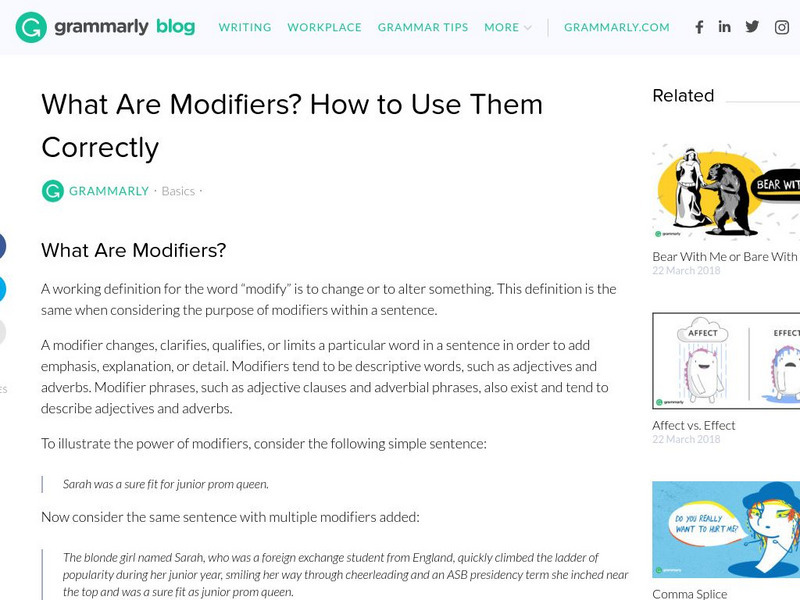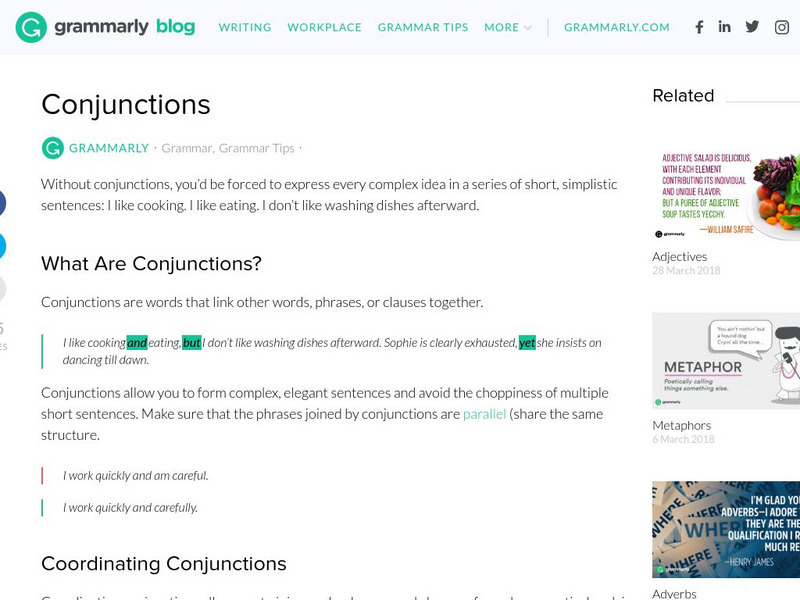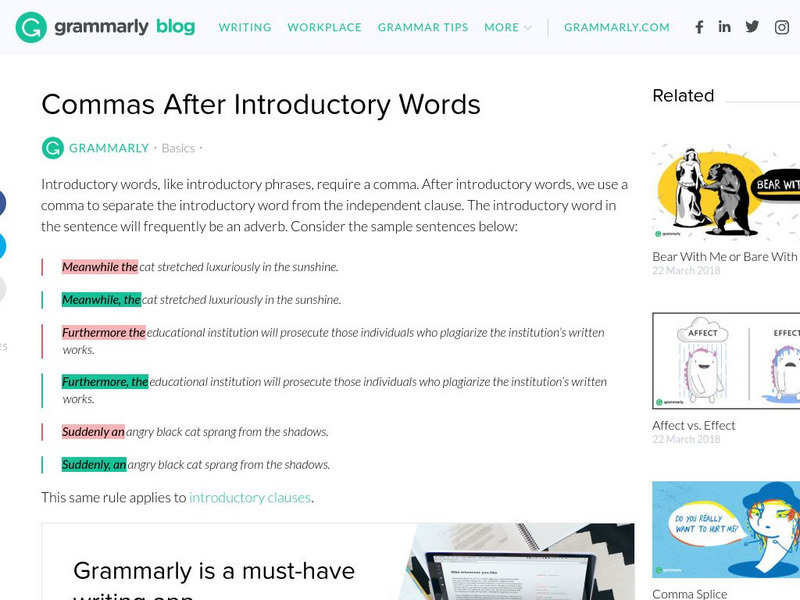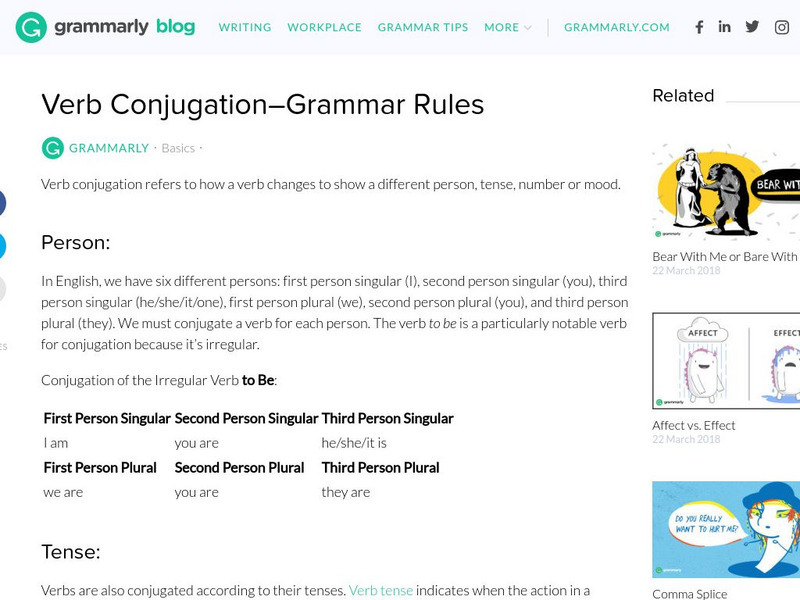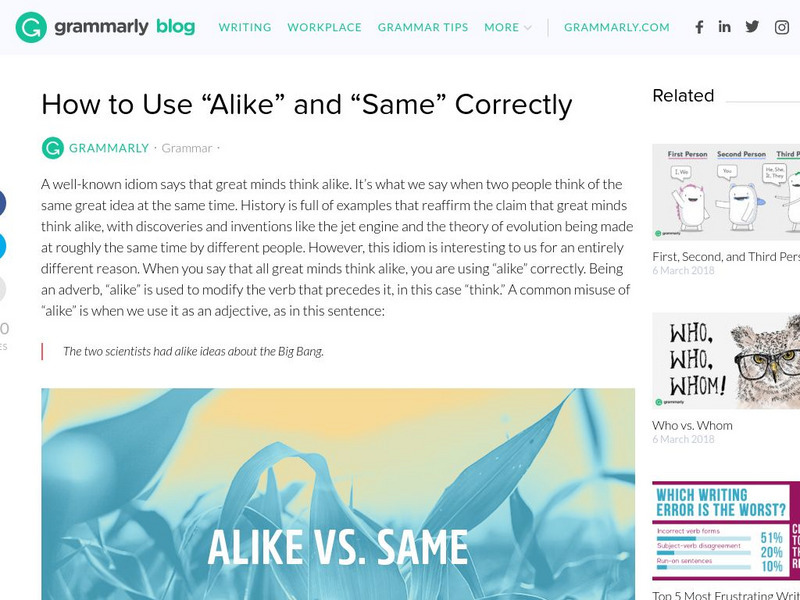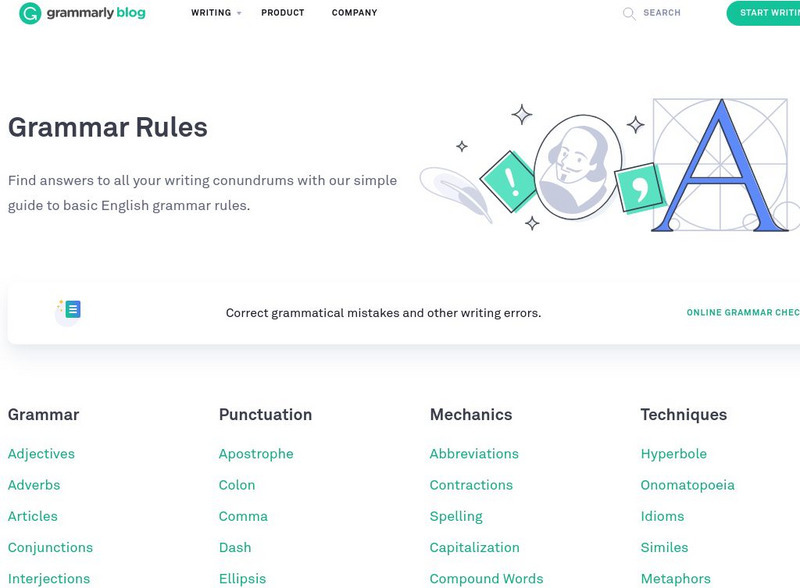Grammarly
Grammarly Blog: What Are Modifiers? How to Use Them Correctly
This page focuses on modifiers including what modifiers are -- adjectives, adverbs, and descriptive phrases and clauses; misplaced modifiers and how to correct them; and limiting modifiers and how to use them. Examples are provided.
Grammarly
Grammarly Blog: Blog: Adverbs: What Do Adverbs Modify?
This blog focuses on adverbs, including what they modify, how to find them in sentences, degrees of adverbs, and examples of each.
Grammarly
Grammarly Blog: Intensive Pronouns
An explanation with examples of intensive pronouns and how they are used in sentences, as well as how they differ from reflexive pronouns.
Grammarly
Grammarly Handbook: Evaluating Resources
This page explains the need for evaluating resources and offers links to rules for evaluating primary, secondary, or tertiary resources and determining if resources are good or bad.
Grammarly
Grammarly Blog: Conjunctions
This page focuses on conjunctions including what conjunctions are; the types of conjunctions: Coordinating, Correlative, and Subordinating; how to start sentences with conjunctions, examples of each of the above, and lists for each type...
Grammarly
Grammarly Blog: Commas After Introductory Words
This Grammarly Handbook resource explains how to use commas after introductory elements. Numerous examples of commas after introductory phrases, introductory clauses, and introductory transitions are provided in this resource.
Grammarly
Grammarly Blog: Parentheses and Brackets
Rules and examples for using parentheses and brackets correctly in sentences.
Grammarly
Grammarly Handbook: Logic in Argumentative Writing
An explanation and examples of several different types of logic that can be used in argumentative writing.
Grammarly
Grammarly Handbook: Supporting Points and Proof
An explanation of supporting details and tips on writing them.
Grammarly
Grammarly Handbook: Main Ideas and Supporting Ideas
An explanation and examples of main ideas and supporting details.
Grammarly
Grammarly Blog: Conditional Verbs
This Grammarly Handbook resource provides the definition of conditional verbs. Numerous examples of sentences with conditional verbs are provided in this resource.
Grammarly
Grammarly Blog: Verb Conjugation Grammar Rules
This page explains verb conjugations including persons: first, second, and third person; number: singular and plural; and tenses: present, past, and future and simple, continuous, and perfect. It provides examples of verb conjugations.
Grammarly
Grammarly Handbook: Reciprocal Pronouns
An explanation with examples of reciprocal pronouns and how they are used in sentences.
Grammarly
Grammarly Blog: 10 Perfect Pieces of Advice on How to Edit Your Writing
A list of 10 ways to edit your writing.
Grammarly
Grammarly Handbook: Mechanics
An explanation of the importance of mechanics and links to additional information on specific focus areas.
Grammarly
Grammarly Blog: How to Use "Alike" and "Same" Correctly
An explanation with examples of using the words "alike" and "same" correctly in sentences.
Grammarly
Grammarly Blog: Adjectives and Adverbs What's the Difference?
This blog article focuses on adjectives and adverbs including their purpose and the confusion between them. It offers links pertaining to adjective and adverb use and misuse.
Grammarly
Grammarly Handbook: Cliches
This page focuse on cliches and explains why they should not be used in formal writing; it provides examples of other words to get the point across more clearly.
Grammarly
Grammarly Blog: Grammar Rules
This is a grammar handbook with links to grammar rules for the parts of speech, punctuation marks, mechanics, sentence style and clarity, composition, academic writing, organization and development, revising and editing, and research and...
Grammarly
Grammarly Blog: Who and Whom
This page focuses on correctly using who or whom. Since who is a subjective pronoun, you can try replacing it with another subjective pronoun such as he or she to see how it sounds. Whom is an objective pronoun and can be replaced with...
Grammarly
Grammarly Handbook: Conclusion or Summary
This Grammarly Handbook resource explains the purpose on writing a summary or conclusion of an essay. Brief "how to" tips are provided for writing a summary or conclusion to an essay.
Grammarly
Grammarly Blog: Learn Your Homophones: Pear, Pair, and Pare
Explore the difference between pear, pair, and pare in this blog post from Grammarly.
Grammarly
Grammarly Handbook: Answering the Opposition in a Persuasive Essay
This page explains when and how to answer the opposing claims in a persuasive essay.


